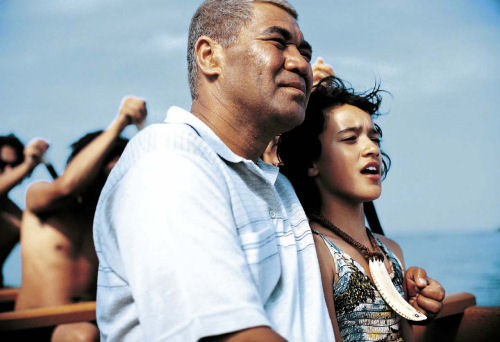Paikea
Apirana, also known as Pai, is a twelve year old girl who was born from a long
line of a tribe’s chiefly succession and is named after the legendary Paikea, her
direct ancestor and the man who was also known for his legacy as a Whale Rider.
Despite this, Pai has been shunned by the other members of the tribe and
especially her grandfather for being born a girl, making her the breaking point
of a line of male descendants which unfortunately also makes her illegible to
be the next tribe’s leader.
Paikea Apirana
There is no denying the fact that Pai has been a strong
character throughout the entirety of the movie despite being shunned and often
put down by people in her tribe, especially her grandfather, for being born a
girl and hence not being the “saviour” that they were hoping for. It may be because
of this less than happy
upbringing that Pai has learned to mature in mind, spirit and emotion, as
displayed particularly in one scene whereby Koro had openly called Pai
worthless and even demanded her father to take her away. Despite the hurtful
words used on someone of such tender and impressionable age, Pai was able to
understand and even rationalized that Koro did not mean what he said.
According to Erikson’s Psychosocial Stages of Development,
Pai could fall under two categorizations which are Industry vs. Inferiority,
and Identity vs. Role Confusion. Illustrating Erikson’s Industry, Pai expressed
the need to prove herself worthy of being the next chief by showing that she is
as capable as the other boys in the cultural school and maybe even better than
them (Santrock, 2011). She was able to master taiaha with a makeshift weapon and defeated a
fellow peer, Hemi, who was probably on the top of Koro’s list of potential
leader. She also manages to effortlessly retrieve the whale tooth from the
ocean, where her other peers have failed, won an interschool speech competition
and ultimately, Pai was the only one capable of returning Paikea’s whale and
its pod back to sea. It was this final display of industry that finally led
Koro to believe and accept Pai as his “Wise Leader”.
 |
| He gave her the whale tooth, symbolizing his acceptance as his leader. |
Additionally, while proving her worth, Pai is also seen
trying to find her place in the community and the role she has to play. Should
she obey the demands of the grandfather she loves by just remaining a submissive
and loyal female in the tribe as is expected of her, or should she fight to
gain the status and respect of a leader that she believes herself to be? During
the beginning stages, we see Pai experiencing role confusion in finding her
place and value and she struggles to disobey her grandfather, eventually
leading her to give up hope that she will truly be accepted and so she decides
to leave her home in pursuit of a new life and a new identity (Santrock, 2011). However, she returns
home as we see her feeling a strong connection to the sea and the whales which
are her identity and her birthright. The movie ends with Pai achieving Ego
Identity, which is the achievement of being one’s true self, by being made
leader as a result of her determination (Santrock, 2011), values and loyalty to the tribe.
Koro Apirana
According to Erikson’s stages of development, Koro displays
the theory of Generativity (Santrock, 2011), in which his main goal was to pass on the legacy
and traditions of the tribe to the potential male leaders of the tribe with the
ultimate goal of passing on the title of chief to one of them for the
development and growth of the next generation. However, when he fails to find “the
rightful chief”, he moves on to the next stage of Despair, resigning himself to
personal defeat and defeat of his people and for a while, he seems bedridden with
despair and frustration and no one’s voice seemed to be able to reach him (Santrock, 2011).
With finally admitting to Pai’s rightfulness as chief, he
finally is in peace with himself as he feels that he has accomplished his role
as a leader and is satisfied that he has chosen the right successor to bring
strength and prosperity to the tribe. He may also feel at peace for finally
being able to integrate his love for Pai and his duties as a chief, which were
originally in dissonance with each other and we can say that he achieved Ego
Integrity (Santrock, 2011).
Santrock, J. W. (2011). Life-span
Development (13th ed.). New York: McGraw-Hill.




No comments:
Post a Comment